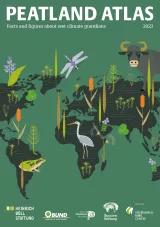
The consumption and production of commodities such as timber are major drivers of deforestation and forest degradation. They also cause peatland degradation on a grand scale.

Europe is a major hotspot for peatland degradation because of peat extraction and the use of peatlands for agriculture and forestry. Other major hotspots are Northeastern China, Southeast Asia and the American Midwest. An estimated 88 percent of the world’s peatlands remain largely unused and undrained. But these ecosystems are increasingly threatened. This is particularly true in the tropics, where only in the last decades peatlands have been extensively drained and their land use converted to provide food, fibre, timber, fodder and fuel. The three main commodities on global peatland are palm oil, cattle and rice. Especially in Southeast Asia, many of the most peatlands are form under forests.
Palm oil is well known for its link to deforestation. This crop is the most efficient producer of vegetable oil, accounting for about 30 percent of world production. After India, the European Union (EU) is the second largest importer, importing 6.3 billion euros worth of palm oil and palm oil products in 2021, mostly for biofuels. Indonesia and Malaysia are the largest producers of palm oil from drained peatlands. Together they supply almost 75 percent of the EU’s imports.
Meat and dairy products also put pressure on peatlands. Eighty percent of Mongolia’s cattle graze on degraded and natural peatlands, for example, though these cover only 2 percent of the country. On the other side of the world, the Pantanal in Brazil – a major wetland including peatlands – is under pressure from cattle production and widespread forest fires used to clear land for expanded pasture. The Pantanal’s wetland area has shrunk by almost one-third since the 1980s, but a recent law allows extensive cattle ranching and tourism in protected areas in the region. In 2022, Brazil was the EU’s largest source of agri-food imports, accounting for 12 percent of its total imports. In 2022, around 52,342 tons of meat (excluding poultry) were imported from Brazil to the German market. The import value in that year was about 111 million euros.
The EU imports around 1.2 million tonnes of milled rice per year, mainly from Southeast Asia. Peatlands and rice production have a troubled history. The most notorious example of rice production on peatlands was the Mega Rice Project, launched in 1996, which aimed to drain and convert 1 million hectares of peatland on the Indonesian island of Kalimantan. The project failed to produce rice on a commercial basis and was abandoned after three years. It failed because the peat, which was more than half a metre thick, provides fewer nutrients than mineral soil, and because it was difficult to control the water levels – which are crucial for rice production. However, Indonesians are still suffering the consequences of the large-scale drainage undertaken for the project, as it is difficult to restore such peatlands to their functioning state. Fires in the former Mega Rice Project area released 173,000 tonnes of carbon each year and created a haze that blanketed the region and forced many activities to come to a halt. Despite this, the Indonesian government has shown interest in restarting rice production in the project area. It is negotiating a free-trade agreement with the EU to increase trade and investment while promoting sustainable development – which should include peatland management issues.
To reduce damage to forests worldwide, the European Union recently adopted a law on deforestation, which came into force in June 2023. It requires companies to trace the commodities they are selling back to the plot of land where they were produced. This is a step forward for forest protection and management, and many forest organisations have welcomed the law and its aim to promote trade of deforestation-free products in EU markets. But the law’s scope is limited to forests, so it could have the effect of encouraging commodity production to shift away from forest land to peatlands and other ecosystems, putting these areas under additional threat. This is despite the legislators’ recognition that efforts to protect forests should not lead to the conversion or degradation of other natural ecosystems. Reviews of the law in 2024 for other wooded land, and in 2025 specifically for wetlands and peatland, will provide an opportunity to expand its scope to include peatlands and peatland-friendly supply chains.
Many countries lack accurate inventories of their peatlands. This makes it difficult to monitor the volume of imports into the EU that have been produced on drained peatlands. Data collection and monitoring of agricultural production on drained peatlands are urgently needed to support peat-rich countries to invest in alternative production practices, such as paludiculture, which have proven benefits for climate and biodiversity. A good example is the EU-funded “People for Peat” project, which supports better peatland management in Southeast Asia. Global agricultural, forestry, mining, food and beverage industries need to invest in product certification and in making their supply chains peat-friendly by ensuring that they avoid the additional loss of peat and do not cause further degradation. The certification scheme of The Roundtable on Sustainable Palm Oil (RSPO) is an example: it does not allow the establishment of new plantations on peatlands. Non-government organisations urge that such measures be included as well as better data collection and monitoring in future revisions of the EU’s deforestation law, and for the law’s scope to be extended to include peatlands by 2025.

